Interview with Pat Cadigan
 Pat Cadigan is the undisputed Queen of Cyberpunk. Her short story Rock On was featured in Bruce Sterling’s movement-defining Mirrorshades anthology (1986), and her novels Synners (1991) and Fools (1992) remain high watermarks for the genre. Both won the Arthur C. Clarke Award. Tea From An Empty Cup (1998) and Dervish Is Digital (2000) feature noir detective Dore Konstantin investigating crimes in virtual reality. More recently her short story The Girl-Thing Who Went Out For Sushi (2012) is an innovative work about body modification in astronauts that originally featured in Solaris’s hard science fiction anthology Engineering The Future and won the Hugo Award for best novelette. She has also written a number of tie-in novelisations, the most recent being Harley Quinn: Mad Love for Titan books with original Harley Quinn creator Paul Dini.
Pat Cadigan is the undisputed Queen of Cyberpunk. Her short story Rock On was featured in Bruce Sterling’s movement-defining Mirrorshades anthology (1986), and her novels Synners (1991) and Fools (1992) remain high watermarks for the genre. Both won the Arthur C. Clarke Award. Tea From An Empty Cup (1998) and Dervish Is Digital (2000) feature noir detective Dore Konstantin investigating crimes in virtual reality. More recently her short story The Girl-Thing Who Went Out For Sushi (2012) is an innovative work about body modification in astronauts that originally featured in Solaris’s hard science fiction anthology Engineering The Future and won the Hugo Award for best novelette. She has also written a number of tie-in novelisations, the most recent being Harley Quinn: Mad Love for Titan books with original Harley Quinn creator Paul Dini.
Pat Cadigan was at SFX Book Con 2 in Foyles, London last month, and was kind enough to speak with The Fantasy Hive there.
Let’s start off by talking about your Hugo award-winning short story The Girl-Thing Who Went Out For Sushi. Would you be able to tell us a bit about it?
Well, that was a funny thing. Jonathan Strahan, who was editing the anthology, asked for short fiction that was set in the solar system in the future but no cheating with faster than light or anything like that. So I did a lot of thinking about, what would be the best thing to do for people in a weightless environment? I started thinking about people living in a weightless environment as opposed to waiting and doing a lot of very expensive terraforming, or making habitats that had to spin and then, if there was a blackout, first thing that goes besides the lights is the gravity. And I thought, you know, it would be cheaper just to adapt people to live in a weightless environment. And then I thought, what would be a good form to live in a weightless environment? I thought, octopus. Because they basically live in a weightless environment, but they also live under pounds and pounds of pressure, so they could take acceleration too. So I had this idea of a future where people could be adapted bipeds or they could choose to go out for sushi. And the story just kind of took off from there. And I was half way through it when I realised that I was writing a parable about trans people. Because I was drawing on a lot of what my friend Roz Kaveney had told me about the process of transitioning and dealing with your friends and your family and legal things and all the rest of it. So I thought, huh.
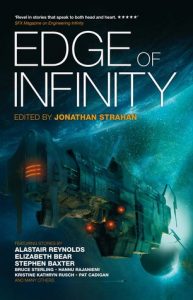 As I finished it, I showed it to some of my trans friends and they loved it. But when I sent it in I couldn’t think of a title, so I just put The Girl-Thing Who Went Out For Sushi on it and I thought maybe Jonathan would think of something better. But you know, he said ‘Oh, that’s the title.’ And it surprised the hell out of me when I was nominated, and it surprised me even further when I won. Because it had been 20 years to the year since my last Hugo nomination. And it wasn’t that I saw myself as washed up or anything, but things wax and wane in popular vote awards, particularly in the Hugo. I was floored and I was gratified and it was the best weekend ever!
As I finished it, I showed it to some of my trans friends and they loved it. But when I sent it in I couldn’t think of a title, so I just put The Girl-Thing Who Went Out For Sushi on it and I thought maybe Jonathan would think of something better. But you know, he said ‘Oh, that’s the title.’ And it surprised the hell out of me when I was nominated, and it surprised me even further when I won. Because it had been 20 years to the year since my last Hugo nomination. And it wasn’t that I saw myself as washed up or anything, but things wax and wane in popular vote awards, particularly in the Hugo. I was floored and I was gratified and it was the best weekend ever!
It’s a change from the cyberpunk you’re originally associated with, but there’s still that theme of humans adapting themselves to the future as the future adapts to us.
A change from the machines? I guess that’s it. I’ve always written hard science fiction, which is to say, science fiction based on actual science. And particularly after Girl-Thing, I got a lot of vocal respect from David Brin and Gregory Benford. They’re both scientists, and Greg is a theoretical physicist, and he called me a hard science fiction writer, so it’s like, I’m a hard science fiction writer. He’s got the credentials and the chops; if he calls you a hard science fiction writer, you are one. But I’ve always written hard science fiction. Because I’m fascinated by science and all things scientific. And I was dyslexic and dyscalculic. So there’s an alternate universe somewhere where I wasn’t and I became a theoretical physicist or a mathematician or something. But I studied it even when I was bad at it, and I got pretty good at it, but what I got really good at was learning. So I was able to learn a great deal. You know what they tell you about how it’s harder to learn things when you’re older? It takes a little bit more effort, but it’s not that much harder, honey, let me tell you! Because I’m in my mid-sixties now, and I’m still learning, and if you get into the habit of it, then it never becomes really difficult to learn something.
That was one of the big advantages of being a science fiction writer: you could do this, and it’s because of your work. I could read in any science. So I wrote science fiction about things that fascinated me. And I was identified as one of the cyberpunks, and the thing about the American cyberpunks was we all had the same landmarks in our personal history, you know, the Vietnam war and the civil rights protests. The Girl-Thing Who Went Out For Sushi seems like a departure, because I’ve written fewer short fiction in science fiction than I have horror and fantasy. But I’m always saying, ‘Get out of your comfort zone.’ That was the one place where I really did finally get out of my comfort zone. I got out of my comfort zone and went into outer space. And it was the one thing that I really hadn’t done. And once I tried it, I really liked it. I’m working on a novel that takes place 150 years after Girl-Thing.
You know what they tell you about how it’s harder to learn things when you’re older? It takes a little bit more effort, but it’s not that much harder, honey, let me tell you! Because I’m in my mid-sixties now, and I’m still learning, and if you get into the habit of it, then it never becomes really difficult to learn something.
– Pat Cadigan
Cyberpunk is interesting because there was that original burst…
Well, the future caught up with us. When people ask me which of my books they should start with, I usually point them at Synners. And I warn them, I say, ‘There’s not as much science fiction in there as there used to be.’ And I wouldn’t write a book like Synners now, because everything has changed so much. But the future caught up with us, and cyberpunk’s not dead; it’s in the fabric of the reality now. And there are women who are writing very hard-edged fiction. Tricia Sullivan is writing very seriously in-your-face, dangerous science fiction. Lauren Beukes, Justina Robson, even when she writes fantasy, it’s hard-edged. So women aren’t as scarce as they used to be, but there still aren’t as many of us. And it’s just one of those statistical anomalies.
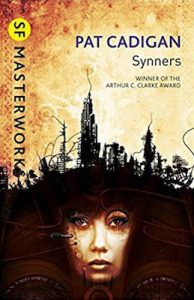 Synners does deal with that in the way that there is a difference between the experience of its female characters and the way they interact with the digital world and their willingness to give up their physical bodies, versus male characters like Visual Mark who’s happy to leave the meat behind completely.
Synners does deal with that in the way that there is a difference between the experience of its female characters and the way they interact with the digital world and their willingness to give up their physical bodies, versus male characters like Visual Mark who’s happy to leave the meat behind completely.
I never really looked at it that way, but when you do, women have always had to work around everything, work around what the world expected of them. Even today, I’m sure that you will find many women in family situations, yes it’s feminist, yes it’s equal, but they’re working around everyone else’s schedule. And that’s the way it’s been for a very long time. I really wasn’t thinking too much about making a big deal about the gendered differences in Synners, I was basically thinking of populating the world with a lot more female characters than you normally saw. Because the truth is, women have always been there, taking part, mucking in. The world isn’t really the sausage fest that a lot of the male-dominated stories would have you believe. And it isn’t as white either. That was my other consideration: that the world is not predominantly white, and the sooner us white people get used to that, the better. And there have been controversies, and people who don’t like the idea and call it affirmative action or equal opportunity or whatever. And to them I say, don’t come to London. In fact, if you do, don’t fall and break your leg. Because you’ll be taken to a hospital, and you won’t see a white nurse the whole time you’re there. And your doctor will probably be wearing a headscarf. My mother grew up in Brooklyn, and she grew up among all kinds of people. And one of the things that she used to bemoan – particularly after we moved out to Kansas City suburb, where we went to take care of her son, she used to take care of him while I worked – she said, ‘There just isn’t enough colour here. People think that this is all there is.’ And when she moved to London, it was an adjustment for her, but she was a lot more comfortable.
Both Synners and Fools have won the Arthur C. Clarke Award.
Synners and Fools, yeah, they won the Arthur C. Clarke Award. And that was a shock to me. In fact, I hadn’t even known I was nominated for Synners. And a friend of mine wrote me – this was back in the days when people had to write letters to each other – and said, ‘Did you know?’ And I said, ‘No, no!’ and I got really excited. And I’ve been nominated for a lot of awards. And my mother taught me, ‘You be a good loser or I will beat you to death.’ And she said, ‘You always congratulate the winner, you know, that’s class. Show some class.’ So, there was never an award that I was ever really disappointed I didn’t get, but when I found out I was nominated for the Clarke, I really wanted it. So I went and I read the other books, and Stephen Baxter’s Raft was one of the books nominated, and I thought, ‘Son of a bitch, he’s probably gonna win! Why couldn’t I write a book that good?’ But I won, and it was a surprise. And then when I was nominated for Fools I was absolutely sure that someone else was going to get it. And John Clute called me afterwards – I was still living in Kansas then – and he said, ‘I’m calling to tell you you’ve won.’ I said, ‘That’s not funny, John. Who really won?’ But I had won. And Paul McAuley called me a few minutes later to congratulate me, and he was one of the nominees. And that was real class.
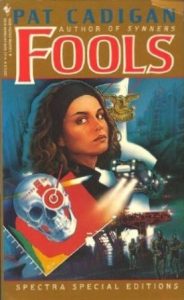 Fools was a surprise because I was sure everyone would think that I had completely lost my mind. But the thing was, I did win that one fair and square, because the Clarke is a juried award, and the jury changes every year. And by the time Fools was nominated, there was no one on the jury who had been on the jury for Synners. So I won fair and square. And I was really gratified by that. I thought, ‘You can do crazy innovative work and still get noticed.’ And by then I was hoping that I was going to be emigrating. And my husband, who was then my boyfriend, had come to stay with us, and he had to go back. And his plane was delayed so he had to go back a day later than he planned, which was the night of the Clarke Awards, and he had wanted to be there, and he told me that he’d written this speech for me, that he was going to give if he accepted it for me, and when he got back of course, next morning, but he found out that I won. So for a while I thought maybe I can never win awards if I’m there. But I was there for the Hugos so, you know, that spoils that one.
Fools was a surprise because I was sure everyone would think that I had completely lost my mind. But the thing was, I did win that one fair and square, because the Clarke is a juried award, and the jury changes every year. And by the time Fools was nominated, there was no one on the jury who had been on the jury for Synners. So I won fair and square. And I was really gratified by that. I thought, ‘You can do crazy innovative work and still get noticed.’ And by then I was hoping that I was going to be emigrating. And my husband, who was then my boyfriend, had come to stay with us, and he had to go back. And his plane was delayed so he had to go back a day later than he planned, which was the night of the Clarke Awards, and he had wanted to be there, and he told me that he’d written this speech for me, that he was going to give if he accepted it for me, and when he got back of course, next morning, but he found out that I won. So for a while I thought maybe I can never win awards if I’m there. But I was there for the Hugos so, you know, that spoils that one.
One of the notable things about your work is that you do just throw the reader right in there. There’s less of a reliance on exposition; the reader has to work out the context as they go along.
Well, this is the sort of thing that I like. This is the type of book that I like to read. I like to jump in, I want to be in over my head right away and try and figure it out as I go along. This is really the story of my life, you know. I never get any exposition or preparation for anything; I’m always thrown in at the deep end of whatever I do, and I’ve got to figure out how to adapt, survive or die! So to me, this is life. And I have started stories where I’m easing into it and I just get so wrapped up in the preparing for it, even I stop and say, ‘Oh just get to the point.’ You get to the point first and help the reader catch up and feel what’s going on. And personally I think that’s a fun ride.
Not only do you write hard science fiction, but importantly you also write hard social science fiction. You get a lot of books that have a really developed science and technology side, but the social side doesn’t seem to have changed at all.
A lot of people think that the social isn’t important, but it really is. I remember when I was reading Future Shock (1970) by Alvin Toffler. And I got to a point in the book and he was talking about how maybe in the future when men are transferred to a job in a different location they’ll just be plugged into another family with another wife and children, and I thought, ‘Uh, this isn’t as future shock-y as you think, pal. What does the other wife and child do? What are we – the furniture, like in the movie of Soylent Green?’
Books like Synners and Fools have a lot of moving parts. How do you construct something that complicated and keep it straight in your head?
I don’t know anymore! I kept Fools straight in my head. And the way I was keeping track of the different people talking in Fools was, I would just put a different symbol at the beginning of each section. The centre section of Fools was a standalone novella. And then I wrote stuff on either side of it and made a Fools sandwich. But I sent it to Asimov’s, and Sheila Williams contacted me and she said, ‘It’s not enough. It’s still too confusing. Suppose you use different typefaces?’ And that was Sheila’s big contribution to the book. And it really kept the book from being a mish-mash. Maybe some people disagree! But it made it easier to understand that different people were talking at different times. And I don’t know how I kept it all straight, because the time that I wrote Synners and Fools – and I finished Synners in mid/early 1990, and it was published in ’91 in the States – at that time I was taking care of a baby. I wasn’t working full time anymore, thank goodness. But there seemed to be a lot of moving parts in my life, lots of stuff was going on, and I was lucky to get bits of uninterrupted time to think about things. But it is a lot easier to keep a lot of things straight when you’re younger. Although I suppose it was simply that I was also immersed in the book. I didn’t have to keep a lot of outside things straight. I was taking care of my son, but my mother was watching him while I was working. That was variably successful!
My son knew Synners as the book that was why mommy couldn’t play with him all the time. And I remember when it finally came out in paperback I found him sitting on the sofa with it, and he was a bit younger than kindergarten then, and I said, ‘I think that book is a bit advanced for you,’ and he said, ‘Yeah, Mom, and you use the F-word a lot too.’ But actually I often credit whatever is good with my writing with my becoming a mother. This is not saying anything against people who don’t want children; the best thing they can do is not have them, God bless them. But only when I became a mother did I achieve a certain higher understanding. Other people apparently achieve this without becoming parents, but it took me becoming a parent to understand more about people in a deeper way. And I have to credit my son with my learning so much about human nature, and I don’t think I would have been as good a writer if I weren’t his mother. And as I said, my life has a lot of moving parts, but it’s all been pretty integrated too. I’ve had my bad days as a parent, of course, but my son and I are still close. When he reached the teenage thing where they stop talking to their parents, he didn’t stop talking to me. And I really have to say that a lot of whatever’s good about my work is what I learned how to do from learning how to take care of him.
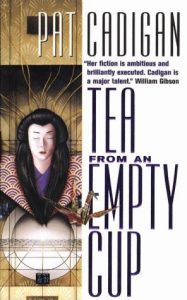 You’ve also written Tea From An Empty Cup and Dervish Is Digital, which both have more of a noir detective feel to them.
You’ve also written Tea From An Empty Cup and Dervish Is Digital, which both have more of a noir detective feel to them.
Tea From An Empty Cup started out as a novella that I was commissioned to write for an anthology of SF about Japan. And Keith Ferrell, who at that time was editor in chief for Omni magazine, commissioned it, and I guess the anthology got delayed and Keith said, ‘I really need this for Omni.’ So I said, ‘Okay.’ And he said, ‘So you have to write me another one for the anthology.’ So I wrote him another one and then I stitched the two of them together and made Tea From An Empty Cup. And it wasn’t the first time I’d done that: my first novel Mindplayers was a ‘fix-up,’ as you call it. The only two books that aren’t fix-ups that I have written of my own work are Synners and Dervish Is Digital. And I wrote Dervish Is Digital simply because I really liked the detective character from Tea From An Empty Cup. I liked her, I liked writing about her, and I wanted to do more of it.
When you have short stories that eventually become part of something bigger, at what stage do you know there is more to them?
I don’t always know. I think of short stories as a clip out of a longer thing. It’s like a snapshot. A snapshot is actually a clip out of a longer event. It’s one thing that happens, and things happened that led up to it, and then things went on afterwards, but you have just this one bit. And quite often when I’ve written stories, I’ll hear from someone who likes it, and they’ll say, ‘So when’s the book?’ Or, ‘I want you to write more of these.’ I don’t necessarily do it deliberately; it’s just the way I write them. I like to suggest that things have gone on before the story and things will go on after the story. And I like the idea of making the reader think about that. I got a lot of feedback that way after the story that I had on Tor.com called AI And The Trolley Problem. Some people thought that it ended, it just stopped, and they argued with that, but actually I raised a lot of questions and then didn’t answer them. And that’s my idea of a story. I don’t have all the answers, and the answers that I have won’t fit everyone. One size does not fit all. And so rather than tell everyone you know the Gospel according to Pat Cadigan, I’d rather make people question.
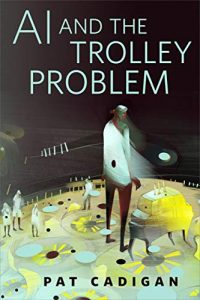 And Gina from Synners first appears in Rock On…
And Gina from Synners first appears in Rock On…
Synners isn’t a true sequel because, if you read Rock On, what’s going to happen to her isn’t necessarily Synners, but I liked the character and I gave the world more thought. When I wrote Rock On, I was really high. On antihistamines. I know that sounds crazy but I’ve always been a cheap drunk. And when I moved out to the mid-Western United States I thought I was dying of a head cold. I’d never had allergies. And suddenly I was Super Allergy Woman. And I couldn’t find anything that worked. And over the years I built up a bit of a tolerance, but every August/September I’d have to dose up on antihistamines, and I’d be high as a kite. I’d be stoned, I was definitely stoned. And I started writing Rock On when I was stoned, and I just kept going with it, and I wrote most of the story on drugs. The fact that they were antihistamines kind of diminishes my image of the hard-living, drug-taking cyberpunk, but there it is. Antihistamines. Hey, you know, you take your highs where you can get them.
You’ve done a lot of work recently writing tie-ins. You’ve done a couple for Titan books…
I did three with them, actually. The one that’s coming out first is Harley Quinn: Mad Love. But I’m an old assignment writer. I used to write for Hallmark cards. I could write those books in iambic pentameter. Be glad I didn’t, ’cause I’d have to force some stuff. But I’m an old assignment writer, I know how to do that. And I got a big kick out of that. In fact, I’d written for Black Library before; I wrote the novelisation of Cellular, and two Jason X, believe it or not, and I wrote some media tie-in things for them. And they’re fun. And people have said to me, ‘Why do you do that? Your own work is so important.’ You know, this is why: when people are done going to the gallery, and they’ve finished all the required reading, they’ve studied up on everything, they take their cues from popular culture. There’s a book called Everything I Ever Needed To Know I Learned From Star Trek. And that’s actually not so far-fetched. And I know it’s taking off on Everything I Ever Needed To Know I Learned In Kindergarten. But people set their moral compasses by popular culture, and that’s who they think of, that’s what they think of, when they’re dealing with their daily lives. So if that’s the case, they might as well read a really good writer like me! And really good writers have done this before. Originally it was James Blish who did the prose version of several Star Trek episodes – this is a long, long time ago. And James Blish is canon. Mur Lafferty did the novelisation of Solo, John Shirley has done it, you know, and these are all very good writers. Christa Faust did the novelization of the Batman comic The Killing Joke. But they’re fun and they remind me what I like about writing. And they reinforce lessons to me about narrative momentum and narrative structure. There are things that have to be different on the page rather than on the screen. Coming up about a week after the official publication date of Harley Quinn: Mad Love is Iron City, which is the prequel novel for Alita: Battle Angel. And there’s no movie associated with it, it’s just a prequel story. And then in December, the novelisation of Alita: Battle Angel will come out the same time the movie does, and that was a fun one. That was a riot. I had great fun writing about Alita.
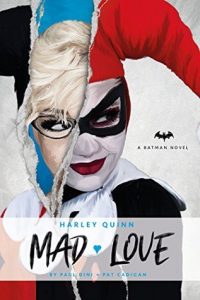 And I had great fun writing about Harley Quinn. There are people who feel very strongly about Harley Quinn; they don’t want to read anything that has her with the Joker because it’s an abusive relationship. You see how that turns out in the book. No spoilers. But lots of people are so sure that they’d never get into an abusive relationship. They don’t realise that it can sneak up on you. And I’ve seen a few women who, suddenly, their lives go straight to hell. And there’s no way out. And these aren’t stupid people. And I’ve seen men get into bad situations. I’ve seen people get into bad situations with friends. And then there’s family, the gift that keeps on giving! I liked Harley because she was a very strong woman who didn’t always make the right decision, but when it came time to do something about it, she did something about it. And she did what she could. And I think that people who maybe object to her relationship with the Joker might give the book a chance, ’cause they’ll be pleasantly surprised.
And I had great fun writing about Harley Quinn. There are people who feel very strongly about Harley Quinn; they don’t want to read anything that has her with the Joker because it’s an abusive relationship. You see how that turns out in the book. No spoilers. But lots of people are so sure that they’d never get into an abusive relationship. They don’t realise that it can sneak up on you. And I’ve seen a few women who, suddenly, their lives go straight to hell. And there’s no way out. And these aren’t stupid people. And I’ve seen men get into bad situations. I’ve seen people get into bad situations with friends. And then there’s family, the gift that keeps on giving! I liked Harley because she was a very strong woman who didn’t always make the right decision, but when it came time to do something about it, she did something about it. And she did what she could. And I think that people who maybe object to her relationship with the Joker might give the book a chance, ’cause they’ll be pleasantly surprised.
And working with Paul Dini was like a dream collaboration. He wrote the detailed outline and I put the flesh on the bones. And we communicated through our editor at Titan. Which was the best way to do it; we’d never met personally. And so everyone was in the loop, everyone knew where everyone was. And there were a few things that I got wrong, and Paul fixed them in the book. But it was a really nice experience. I would work with him again in a heartbeat. And he has been very generous in praising my work. And when I sent in my dedication, and he sent in his dedication, and his dedication reads, ‘To Arleen Sorkin, who gave Harley her voice, heart and soul in the Animated Series, and Pat Cadigan, who did the same in this book.’ And I thought that was incredibly generous. And he’s been super, it hasn’t done me any harm at all. And like I said, working with him was great and I’d do it again.
What’s next for Pat Cadigan?
Well, see, there’s the super secret project that I can’t talk about! And in between, I’m fulfilling short fiction requests and still working on the Sushi book. It seems to get more complicated every time. Every morning I get up and look at it, and it gets more complicated. And I started to wonder, ‘How do people ever write space opera? How do people do this?’ But once again, it’s in the solar system, there’s no cheating. Well, there’s no cheating by the people. There is a little bit of cheating – and basically just for the sake of being able to add our perspective – to look at it through our present-day eyes without me talking about it, without the author doing it. I’ve come across some things, some decisions I’ve had to make about the future and the society, and not all of it is the sort of thing that I’d care for, but you have to make some decisions when you live in outer space. And one is that everyone in the society is always under surveillance, and they expect it. Because these are people who join the people who originally made the habitats, and the people who constructed the habitats expected to be kept track of every moment, and if they weren’t, they were in danger. People can’t just get up and walk away. If you’re in a room, you have to have the right to be there; you can’t just enter a room, because you’re breathing someone else’s air. So there are things about calculating the life support and things like that, and it’s gotten terribly terribly complicated, very complex. I’ve been working on it for years, and part of the thing was, for over ten years I was taking care of my elderly mother. That’s where people from my generation got squeezed from both sides, with kids and parents, and as soon as our kids went to school our parents needed care. And I will take a cholic-y baby over a cranky 90-year-old any day. Because you can put the cholic-y baby on a running dryer in the basement, and it will shut up. The cranky 90-year-old won’t. I should talk – one day, with any luck, I’ll be a cranky 90-year-old!
Thank you for talking with us Pat Cadigan!

[…] 7: Patterns by Pat Cadigan (211 […]